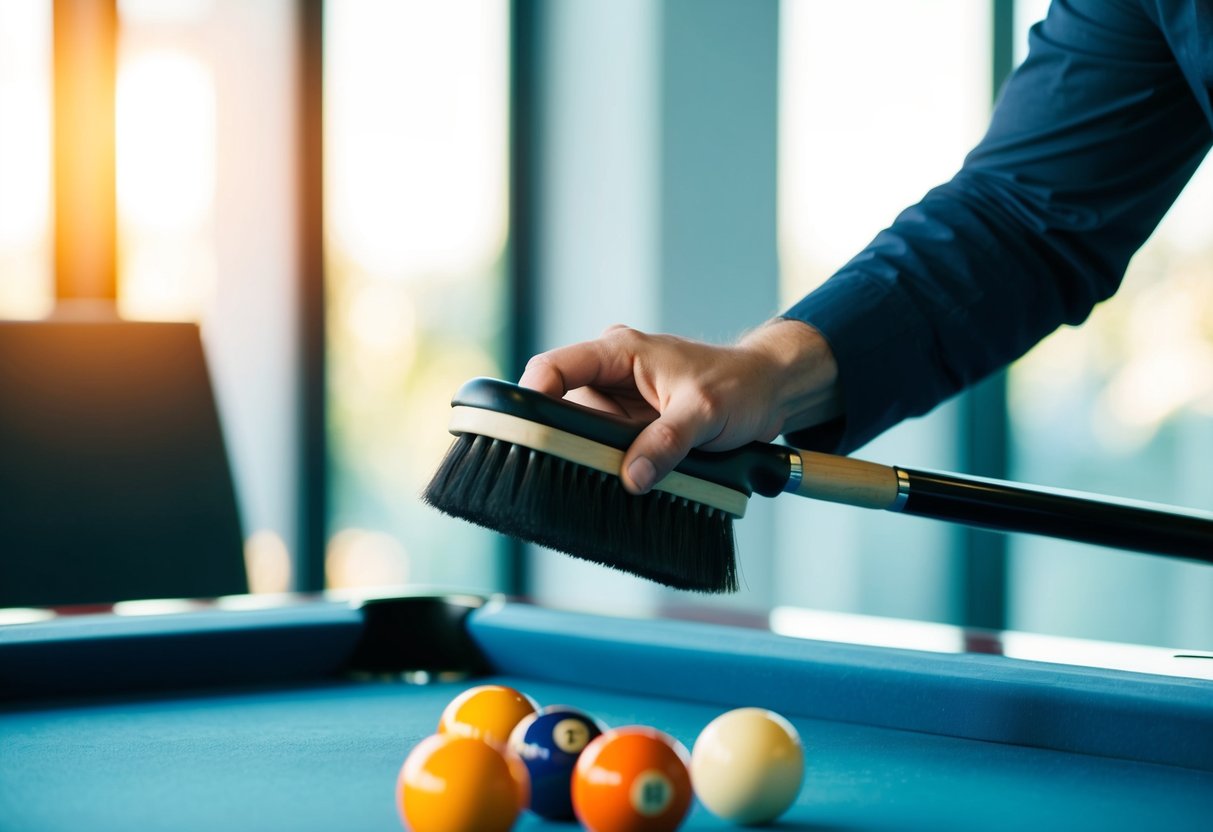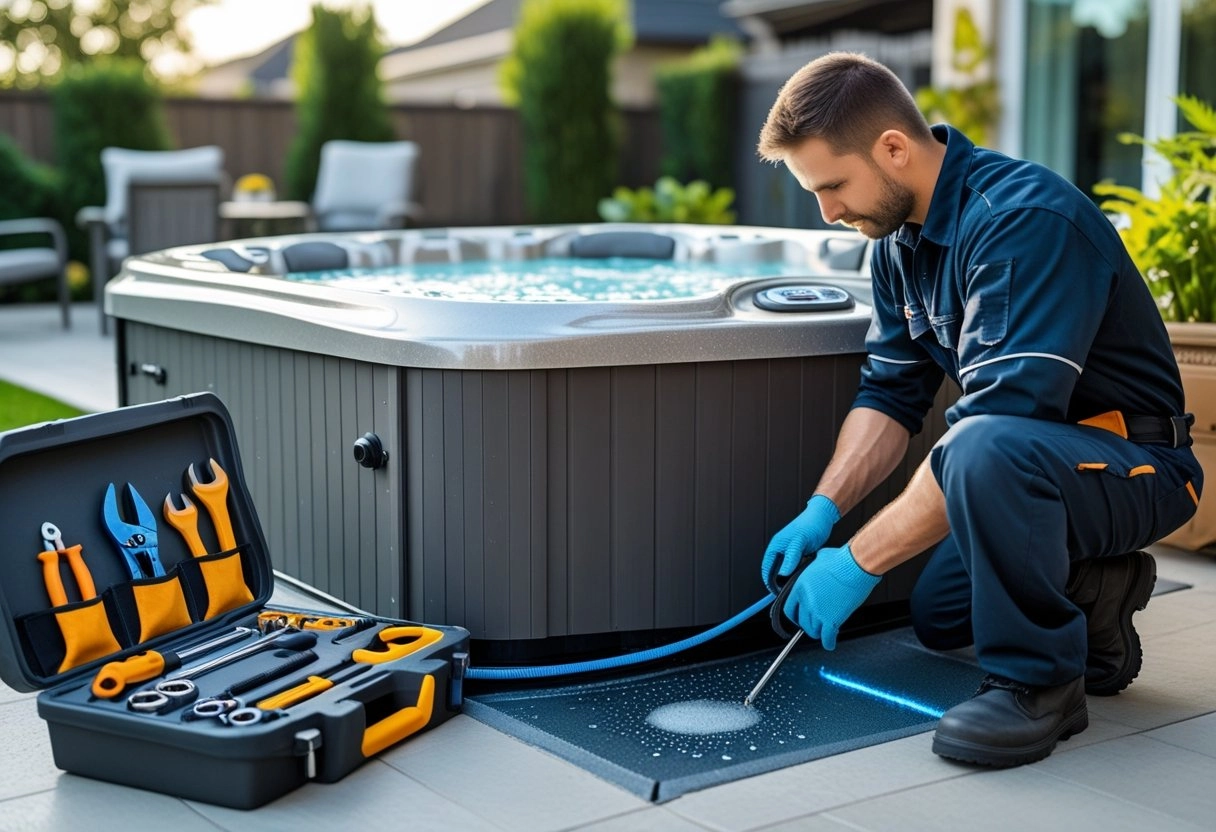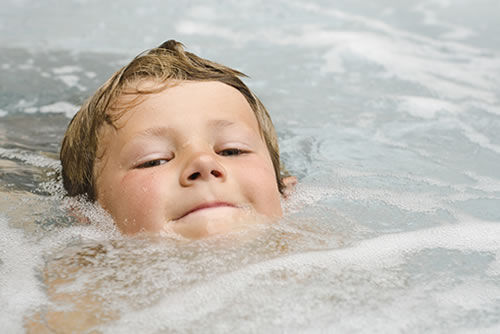If you’ve played on a pool table that felt rough or where the balls rolled unpredictably, it probably needed a good brushing. We’ve all done it: set up what should be an easy shot and watched your cue ball take a funny bounce due to chalk dust and dirt on the felt.
Brushing a pool table might seem inconsequential, but it actually can shape how the game plays. Regular brushing makes that surface buttery smooth, which makes for an enjoyable experience and a game that’s at its best. Dust, dirt from chalk, and just random dirt from playing too many games can throw off how the balls roll, leading to those “what the heck just happened?” moments that leave us questioning our competence, if not confidence.
And let’s be honest, it’s not only performance. A brushed pool table looks very professional and funky to play on. There is something rewarding about surveying those neat, uniform brush strokes over fresh felt that screams, “this is where real pool goes on.”
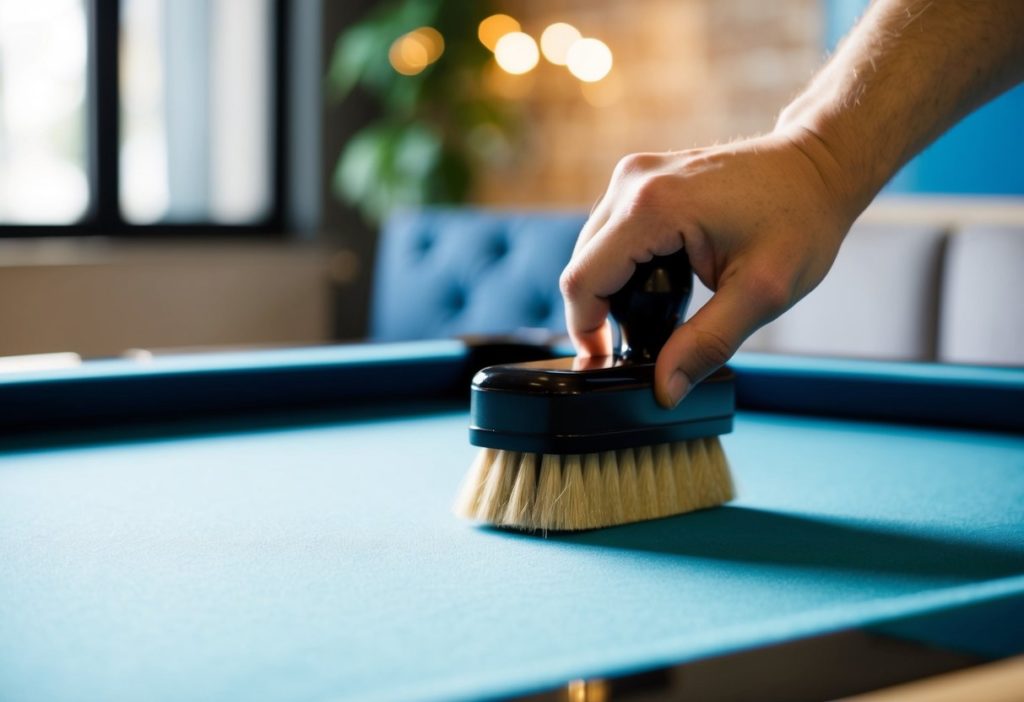
Why Your Pool Table Deserves Better Care Than a Simple Wipe Down
Most people think they are helping their table with a quick dust off here and there. We say this is like washing your car with a hose and calling it detailed. Your pool table is a large investment—not always a tiny amount—and deserves similar upkeep value. We’ve witnessed tables that seemed to have decades of life in them become completely destroyed in a couple years because their owners didn’t have an understanding of maintenance. The felt looks broken and patchy, the rails are dead and don’t hold any bounce, resulting in costly repairs or all-out replacement. Industry experts report that a properly maintained pool table can last 15-20 years or beyond, while the neglected ones will be needing some serious repair in 5-7 years.
Regular brushing helps remove chalk dust that, over time, acts as sandpaper against your felt. Each time you take a shot, tiny particles are created and “stitched” into the fabric, and if you are not properly getting rid of them, they will, in time, eat away at your playing surface. It doesn’t happen all at once—i.e., you won’t notice it going day to day, but over the course of time, one day you wake up and think, “My table doesn’t play the same.”
Think of brushing as preventive medicine for your table. A couple minutes after each play session will save you hundreds or even thousands down the road.
Dive Deeper into Pool Table Maintenance (Because Your Pool Table is Talking to You)
Your pool table is always talking to you about what it needs; you just have to listen. When you run your hand lightly across the playing surface and it tugs back slightly, it’s telling you about chalk dust that’s embedded. When you see areas that look slightly different from the light, it’s chalk dust embedded or wear from not cleaning or just neglect.
What the Regular Maintenance Expert Never Told You
What we have learned over many years of helping our customers with maintenance, consistency beats intensity all day long. You won’t spend an hour deep cleaning your table if you’re brushing after every use, which is what you should be doing. But if you skip it, you will certainly be looking at a major restoration effort before you know it.
Dust builds up faster than most people understand, especially in a game room with a lot of foot traffic and circulating air. That chalk dust? Seriously crafty little pests—they’re so fine they go deep down into the felt, where they can do the most damage. Brushing at least weekly, and ideally after every use, minimizes that dust buildup and maintains a uniform playing surface.
We always tell our customers to consider their pool table like they do their car. You wouldn’t drive it 10,000 miles without an oil change, right? The same approach here. Regular, and simple, maintenance helps you avoid costly trouble.
Professional pool halls brush their tables multiple times a day because they know one key question, “What is the difference between a good table and a great one?” Maintenance, not price.
Different Tables, Different Areas of Care Passive Responsibility
No two pool tables are the same, and knowing what your table “is” makes a huge difference in how you maintain it. Slate tables—known as the king of the hill for serious players—require a surface that is maintained regularly with careful, gentle use. They’re built to last generations and show the utmost respect. Wood-backed tables (like many in home game rooms) are more affected by humidity and heat. They require more care to avoid curling, which will impact the entire experience of play. We have seen many beautiful tables damaged because the owner did not realize their basement game room would be damp in that season.
The felt itself varies tremendously across brands and price points. Higher-end woolen felt, for example, is ready for more gentle care, while certain synthetic felt blends could handle a bit more aggressive cleaning style. Knowing what kind of felt you have helps you know how to brush and how frequently.
Here’s something most people don’t think about: your table’s age impacts maintenance needs. A new table requires lighter brushing and more frequent brushing for original felt conditioning; an aged table may require heavy cleaning and less frequent brushing to limit wear.
Tools That Matter (And Don’t Matter)
If you go to any pool supply store, you are surrounded by products that claim to be your harbor from care. In reality, to care for your table, you need very little, but it is not the quantity of the items as much as the quality that leads you to victory.
A proper pool table brush is the most important. We mean a brush that is manufactured specifically for pool table felt, not something unidentified from within the garage. The bristles are important; they need to be firm enough to engulf embedded products but soft enough to not impart harm onto the fabric. That is why horsehair brushes are the common go-to—they provide both strength and gentleness.
Nylon bristle brushes are very resilient and clean well in most home applications. Nylon retains its shape longer than natural bristles and is cheaper to replace.
You just want to make sure you’re not buying a generic cleaning brush but rather one specifically made for pool tables.
Your second must-have tool is a vacuum with a soft brush attachment. The vacuum is perfect for collecting all the fine particles that are disturbed by the brush but not fully removed. The key to the vacuum brush head is “soft,” because those aggressive carpet vacuums will destroy your felt in no time—you don’t want that to happen!
And what do you avoid? Ridiculously expensive specialty cleaners, steam cleaning, and any type of wet-cleaning processes. Pool table felt is designed to be maintained dry, and adding moisture will present more problems than benefits.to come.
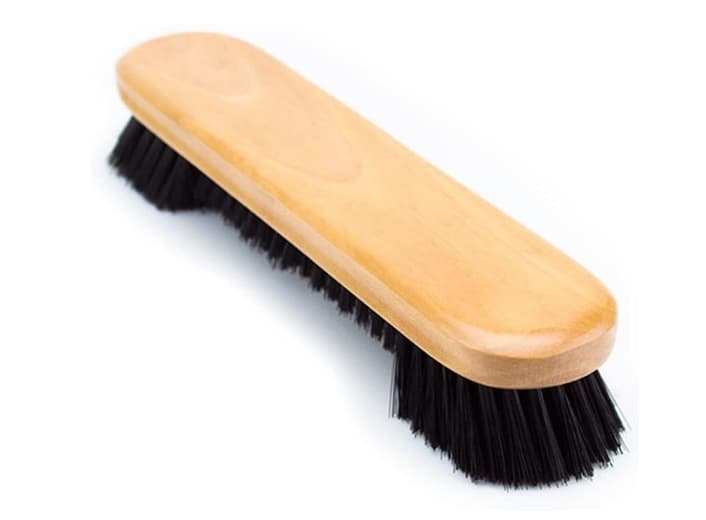
Picking The Right Brush (Because Not All Brushes Are Friends)
When you are looking at brushes from $15-$150, it can become overwhelming. What is important is to choose the brush that works for you, your felt, and your cleaning style. In other words, spending $30 and utilizing the brush versus spending $100 and never using your brush because it looks too nice.
Types of Brushes (The good, the bad & the overpriced)
Nylon brushes dominate the market, and for good reason. They work, they last, and they are reasonably priced. They keep their shape after hundreds of uses and they feel good on most felt. They work well for tables that are regularly used because they can take that brushing they need.
But here’s where it gets really interesting: dual-level brushes, with two different length bristles, will reach into folds and corners that a standard brush cannot. Those areas become built up with chalk dust and debris, creating uneven playing surfaces.
If you are serious about maintenance (and you should be), this is worth the extra investment.
Horsehair brushes are the traditional way of caring for a pool table. They are gentler on the delicate felt and won’t cause as much wear too early. The downside? They won’t last as long as synthetic alternatives, and they generally cost more upfront. If you have a high-end table, with expensive felt, being gentler is worth the cost.
Some brushes have a removable or replaceable head. It sounds convenient, but it usually just makes it worse. The points where the head connects can work loose, and this causes more uneven pressure while brushing. As in all cases, do not have removable heads unless you have a specific reason for it.
Material matters more than marketing.
Natural fiber brushes (horsehair being the most common) are ideal for soft cleaning without damaging the fabric. They are especially effective if you have expensive and/or delicate felt, which needs delicate treatment. The bristles gently contour to the felt texture instead of fighting against it, preventing you from wearing out spots or pulling threads.
The bad news? Natural bristles decompose over time and can shed. So you will have debris on your table. They also tend to diminish in effectiveness over time, so you will not know when to replace them.
Nylon bristles provide durability and durability. When using a quality nylon brush, it will perform nearly the same on day one as it will after one month of constant usage. Nylon brushes are also much easier to clean and care for, which is kind of a huge deal, actually.
Here’s a topic no brush supplier will tell you: bristle density matters as much as bristle material. Too many bristles, and the brush will have trouble lifting particles. Too few, and you will either miss spots of dirt or unevenly clean the table. Ideally, you want a moderate bristle density where it is nice and hefty without feeling cumbersome.
Finding Your Ideal Pool Table Brush
The best pool table brush is the one that you will actually use on a regular basis. We’ve seen top-notch and expensive horsehair brushes collecting dust while the owners simply grab whatever is within reach for a quick tidy-up. It’s the equivalent of purchasing a California convertible and walking everywhere. It’s pointless and defeats the purpose.
Consider the frequency of play. Tables played on a daily basis typically need brushes that can withstand the heavy use without falling apart. Tables played on weekends can get away with a gentler brushing that is unlikely to withstand constant use.
Above all, is size. The sizing isn’t what most people think. Larger brushes do clean areas faster, but they are clumsy in corners and around the rails. Smaller brushes are more useful for control, but will take longer to go across the entire playing surface. Some people will have different types of sizes and will use the larger brushes for the main areas and the smaller for details.
Finally, the handle. The handle design will change how comfortable and efficient your brushing practice becomes. A good handle is comfy and doesn’t cause the hand to tire quickly after a lengthy session. Some handles are too short and will make you bend over the pocket awkwardly. Some handles are too long and either provide too much distance from the table or don’t allow you to have precise control.
The Brushing Technique (Where The Magic Happens)
This is where theory meets life, and where most people come away with great results, or create issues they don’t even see they’re doing. Timing may have a role here, but proper brushing technique is not that complicated; however, it requires detail and the repeatability that separates the casual owner and the serious player.
Getting The Table Ready (It’s the Main Thing)
Before you even pick up a brush, take a look at your table first. Are there visible blemishes or stains that will need to be addressed? Are there balls or items sitting on the table? This is a crucial step because evaluating the condition of your table can eliminate problems and also will allow you to avoid brushing trash from your table.
Remove everything off the table—balls, chalk, drinks (yeah, please, for the sake of your table, don’t put drinks on it), and other things clearly. This should go without saying but some people will try to brush around things and then miss and get uneven cleaning.
Again, while you’re at it, take a look at the fabric. Are there rips, signs of wear, or stretching of the fabric? Brushing on top of damaged fabric could add to the problem, so take care of that before you proceed with your regular upkeep.
Lighting makes a difference than most people think. Good lighting allows you to see chalk dust, debris, and the results of brushing. The best lighting is natural light, but bright LED lights will work well too. Poor lighting results in missed spots and incomplete cleaning.
Felt Care Basics (This Is How Technique Distinguishes Newbies from Professionals)
Starting at one end of the table and working methodically to the other end is not only for appearance but it affords you area coverage so that you do not re-contaminate an already cleaned area.
The method to effective brushing of felt is understanding how the fabric is woven. The cloth of the pool table has a directional weave, and brushing with the grain is always more effective than against the grain. You will immediately know which way is correct—brushing with the grain will render that the brush glides across the fabric while lifting the particle. Against the grain will show the rough resistances.
Use strokes that are straight and that do overlap rather than circular. Circular brushing may feel like it’s working out your dirt easier, but it forces the particles deeper into the felt, leaving the next amount of dirt and even creating permanent wear marks. Straight strokes will lift the debris up and away from the surface, where it can be easily disposed.
Pressure is very important here. If you are too gentle, you will not get the embedded particles up. If you press too hard, you can damage your felt, or create unevenness. Firm pressure without aggressiveness is a good likeness. Brushing out lint from a wool sweater would be your pressure rather than very scrubbing out a stain in the carpet.
Around the spots and foot spot gets more care. Here is chalk and dirt collected when the balls are spotted. These areas can become more dirty than the rest of the table, and may need an extra couple strokes than the rest of the table, but do not overdo it.
Rail Cleaning (The Details That Make a Difference)
Routinely, rails are overlooked during cleaning, yet they are vital to cleaning ball action when taking bank shots. Over time, chalk dust and oils from players’ hands build-up on rail surfaces, thus interfering with how balls rebound.
For our purposes let’s use a rail brush (or corner of your table brush) and do the following: Start at one end of the table and go around the entire table systematically, paying a close attention to the cushion tops and sides where players usually rest their hands; they can become unexpectedly dirty and there might be no noticeable signs of dirtiness until after cleaning.
Don’t forget the pocket areas as well. When balls drop into pockets they hit the canvas with substantial force, which creates a little cloud of chalk dust that floats down to settle on the immediate areas around the pockets. Use your brush to clean around the pocket openings and the inner sides of the pocket.
Don’t neglect the rail sight lines; those are the top edges where players normally rest their hands on when spotting shots. They mainly collect oils and dirt from player hands and ultimately end up getting transferred to balls that are going to the felt.
Finishing Up (Because How to Finish is Important)
Thus, after all surfaces and rails are brushed, step back and take a look at your work. The felt should look the same, or the color shade should look evenly shaded; and without the obvious area missing or streaks alone the lines; If you find an area without movement, fix it now—Now Hoping It Would Disappear Lately. You could also use a vacuum with a soft brush accessory to remove the dust-like particles that brushing released. Sweep across the surfaces while maintaining the same height to avoid pulling the felt. This step erases the fine particles that brushing loosens, but cannot remove altogether. You can use this time to remove the balls and (if applicable) the accessories. Be careful not to redo your cleaning after you do. With the balls, it’s also a chance to clean them since they accumulate chalk or oils while in play, which are left on your freshly cleaned felt.
Spend a moment to clean your brushes and put them away properly. Give them a slight shake to release the loose particles and place them in a clean and dry place where the bristles won’t be bent or damaged. Proper brush care will prolong their life and keep them effective.
Extra Pool Table Care (The Important Stuff That Makes Tables Good vs Great)
Regular brushing is certainly the heart of pool table care, however, it’s only one part of the overall picture. Tables that look like new and play like new for many years receive a high level of care for every component, not just the front runner.
Intelligent Vacuuming Techniques (More Art than Science)
Vacuuming extracts the fine particles we can’t brush away, but technique here matters significantly. Too strong of a suction can damage felt, too weak will leave particles that may become problematic.
Set your vacuum for medium suction and only use soft brush attachments designed for delicate fabrics. Hard plastic attachments would scratch or snag the felt that causes permanent damage and can be costly to repair. Work in the same systematic pattern for brushing as you use to maintain distance from the attachment to the felt surface. Getting too close will pull at the fabric; being too far away is not effective.
Be careful around corners and rail areas where particles build up. Typically these areas will require multiple passes to achieve the same cleanliness as the playfield itself.
Frequency is determined by how you use the table; weekly vacuuming usually works for most home tables. Daily use tables may require this more often; once a month (or more) for occasion tables.
Managing Your Arsenal (Cues Matter Too)
Your pool table is only as good as what you use with it, and caring for pool table accessories means cues, balls, racks and anything else that touches the playing surface.
Balls and pocket liners must be cleaned on a regular basis. For ball cleanliness proper maintenance; for pocket liners it’s all about condition. Remove chalk residue and oils that transfer on the ball using a soft, slightly damp cloth. As long as the ball surface is “dirty”, it will transfer the contaminants to your felt after you just cleaned it. Some players even use a ball-cleaning cloth during the game, to keep their balls clean between cleanings.
Cue maintenance has more of an affect on cleanliness than most people think. Chalk residue from the cue tip, to the cue ball, to the entire playing surface on a continuous basis. Cue tips and chalk need to properly maintained to reduce the cycle of contamination.
Cues should be racked away from the playing surface to avoid warping. Leaning against the wall or simply lying flat can create a permanent warp that both affect playability of the cue and once again cause miscues and resultant felt damage.
Occasionally check your leather components (pocket liners) for conditioning to avoid cracking and disintegration. If you use a leather conditioner, be careful not to over saturate the leather. Oversaturation can not only stain the surface, but it can draw dirt to your balls and the felt surface they transfer to.
Protection Strategies That Actually Work
A good quality cover is about the best investment you can make for the life span of your table. Cover protects from dust, sunlight and spills, and maintains a more constant temperature and humidity environment around the playing surface.
Use pool table covers vs furniture cover. A pool table cover is fitted to the shape and proportions of your table, lending itself to better protection and easier application.
You’ll be surprised how much more humidity control matters than you realize. The extreme temperature and humidity shifts will cause the wooden components to expand and contract that causes the table shape and felt tension to shift. If possible, maintain a constant environment all year in your game room.
Direct sunlight fades and unevenly wears felt play surface material. Avoid windows and cover with window treatments to block or limit the exposure during peak sunlight hours.
Keep food and drinks off playing surface. Residue produced by spills is impossible (or difficult) to clean fully, and stickiness attracts dirt, which speeds up wear. Make sure this is a house rule.
Integrating Pool Table Maintenance into Your Life (Making it Sustainable)
The major difference between the tables that last for decades and the tables that end up needing replacement sooner than later is often down to one thing: consistency. A few times a year, you have a big Clean-Up Day to focus on deep cleaning while you neglect maintenance for the other 364 days; it doesn’t help. Regular, low-income techniques will keep your Table in great shape for very little overall effort.
Developing Habits that Stick
Start with your core habit of brushing after each game. When you are done playing, take two minutes to brush your table and remove any debris. You’ll prevent build-up and deep cleaning will be much easier and more efficient when you are doing this regularly as opposed to once a week.
Then just develop a simple weekly maintenance habit of thorough brushing, vacuuming, and it’s best to clean your accessories (cue tips, rack, chalk, etc.) at least once a week. Set a time and day so you can have a designated and automated process that you do just like when you remember to clean.
Finally, have your supplies visible and accessible near the table. If you have to search for your brushes or vacuum hose attachments, you’re not going to do it as often. Consider a small cabinet or drawer plugged directly adjacent to the table for your supplies.
Lastly, a simple log or calendar entry of maintaining your Table is helpful. It gets the routine established and also provides a record of your maintenance now and, if you ever need to take advantage of your warranty or sell the Table later.
Assessing and Modifying Your Cleaning Techniques
Tables change over time as use patterns, environmental conditions, and age of components change. What worked well in the first year of your table may need to be modified as it ages.
Pay attention to how your Table is responding to your cleaning regimen. If you see a lot of dust, you may need to brush more often. If your felt looks beat up even with regular care, check your technique and tools to see if there is something you can do better.
Seasonal changes can have a dramatic impact on your table’s condition. Humid summers can mean you need to brush the table more often to prevent moisture issues, while dry winters likely mean a bit gentler brush is needed to prevent static.
Consider professional maintenance each year or every other year, depending on how often you use your table. The technician can do things you may miss and help with recommendations to optimize your home care process.
Make it Enjoyable and Not a Chore
Turning table maintenance from a task to a practice involves focusing on the joy of practicing proper care and the gratification of it. There is something rewarding about getting your felt back to where it should with proper cleaning.
You could involve family members or regular playing partners in the maintenance activities. Shared ownership makes the effort easier and keeps the care consistent during busy periods.
Acknowledge the milestones in your table’s life— anniversaries, big tournaments played, or just reaching milestones of game counts. This will give you a profound emotional investment into proper care and a positive experience with the maintenance practice.
Snapshot the condition of your table once in a while, to document the results of proper care. This allows you a visual history of your investment being maintained and a source of motivation when it may feel tedious to keep maintain the table!
Frequently Asked Questions
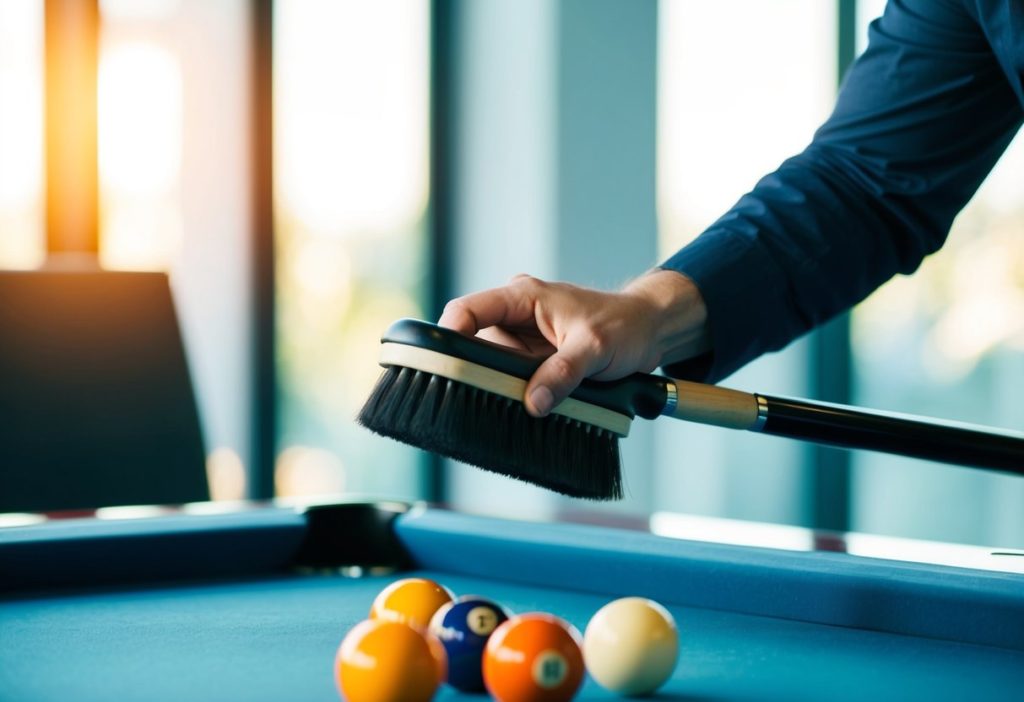
We receive questions about pool table maintenance incessantly, and these questions are always the most prevalent. Here is what people want to know:
What is the best way to remove stains from pool table felt?
To remove stains from pool table felt, gently blot the cloth with a clean cloth. Do not rub, and do not scrub. If necessary, use some cold water with a bit of a mild detergent to help. Patience and gentleness are key. You will damage the cloth in cleaning more than the stains will. Allow the area to air dry completely before playing again.
Is it safe to clean your pool table felt with a homemade cleaning solution?
Yes, but keep it simple. Cold water and a small amount of mild detergent work in most situations. Stay away from the elaborate cleaning cocktails that come up with an online search; they tend to do more harm than good. Be sure to always test any solution in a corner first, letting it dry, to make sure that it does not discolor or damage the felt.
Can the felt of a pool table be cleaned with a steamer?
Absolutely not. The introduction of heat and moisture to the felt can cause it to shrink, warp, or become loose. We have seen beautiful tables that have been ruined by people trying to give themselves a steam cleaning treatment when they thought the results would be professional. Stick to dry. Your table will thank you for it.
What are the basics included in a pool table cleaning kit?
A basic kit needs three things: a quality soft brush (horsehair or nylon), some clean microfiber cloths, and maybe, if they are really bad, a specialized felt cleaner. Do not buy into a really expensive cleaning kit filled with tons of cleaning products. Most of the cleaning equipment will just end up being thrown in the closet and never used.
What is the best product to use for cleaning pool table felt?
To be honest? A good brush and using a consistent method of use will take precedence over the cost of any cleaner. If a specialized cleaner is necessary, there are two manufacturers of pool table felt (Simonis and Championship), who each make a decent cleaning product specifically for pool table felt that has decent results without leaving behind any residue. But the bottom line is it is always better all around to prevent it than clean it.
How do I find a professional pool table cleaning service?
Look for a service that specializes in billiard equipment, not just a general cleaning company. Read the reviews from existing pool table owner customers and make sure business has expertise in your specific table make and model. A reputable cleaning service will examine the condition of your pool table then explore the next steps necessary to take to clean the table.
Are You Brushing Your Pool Table Often Enough?
Here’s the ugly truth that most people do not want to know for themselves: if you play frequently, then after every play session, you should brush it. Turning a blind eye to brushing it allows chalk to settle into the felt which is like sandpaper in the end. We have seen some tables that the outside looked perfect, and chalk embedded inside was ruining the fabric.
Covering your table in between games works well too—it will keep any dust and dirt from settling when not being played. But the most important thing is: gentle, frequent maintenance is better than aggressive, infrequent cleaning always. And the table as a whole will last longer and play better too.

